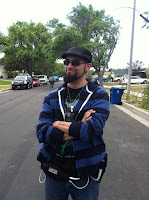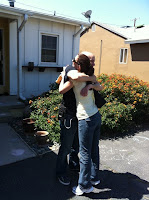advocate: to speak or write in favor of; support or urge by argument
caregiver: a person who cares for someone that is sick or disabled
You know, before Kevin left the hospital back in November, I had to undergo LVAD & caregiver training at the hospital. The nurses and the VAD team were my teachers. Naturally I aced. Kevin's parents and our friend Chad took LVAD training. Anyone that got LVAD training after November (my parents & other friends) was trained by me, since I'm an expert. :-)
Part of the LVAD training is to know what to do in the event Kevin has heart failure again. Yes, folks the LVAD is not 100% fool proof, things can go wrong. Hence the training. One of the things is if you're with him when this happens you need to be Kevin's advocate. Stay by his side, alert paramedics that he has a Heartmate II LVAD, alert them not to do chest compressions (it could kill him), and to call the LVAD pager ASAP. I worry about this all the time when I'm not with him. I worry that whoever he is with if they are good in an emergency situation, if they are quick on their feet, if they'll be his advocate in my absence. If they're not, then well, they'll have me to deal with after.
Kevin also wears a medic ID necklace and always has his backup bag with him. The backup bag carries additional batteries, an extra system controller, extra battery clips, and a few other essentials he needs. There is also a medic alert ID attached to this bag. This all in the event should something happen when he's by himself and no one is around to be his advocate. If this should ever happen I would HOPE that the first responders notice his backup bag or medic ID necklace.
For me being his caregiver, being his advocate, well, it goes further than just the "in case of emergency" situations. Just to give you an idea:
- knowing and/or being aware of all the alarms, bells, & whistles that are associated with the LVAD.
- contacting the local fire departments (our first responders) should we have to dial 911 again, and setting up LVAD training for them.
- contacting our local hospital's ER should Kevin have to go there to be stabilized before being transferred to the VAD team's hospital.
- medication management. (this will come in handy for after transplant)
- daily sterile dressing changes on his drive-line site. ordering the supplies to do this.
- checking his daily flowsheets which is where we log all the LVAD readings, blood pressure, weight, and temperature. knowing when to call the LVAD pager.
- getting him to/from the labs. Well, he can do this now since he's driving & it's only 3 miles away. But I'm the one reminding him when to go, I'm the one following up with the VAD team to see what his INR is. INR is important...too low his blood could clot which is bad for the LVAD. too high meaning his blood is too thin he could bleed out.
- VAD clinic visits and in general any doctor visits.
- re-adjusting our earthquake emergency plan to fit in the "what to do" and "how to get by"
- dealing with health insurance. the claims. the denials. the idiots.
- being his emotional support.
I'm saddened to say that I have been unsuccessful in getting the local ER and fire department to be trained. After several phone calls and empty promises, still nothing. Today was their last chance. If I hear nothing by tomorrow, then our local ER will be getting a visit from me in my current monster bitch state. I'm not giving up.
Health insurance. Yuck. I'm still not ready to "discuss" Mr. Insurance but I will share one story with you. At the beginning, Kevin had to be helicoptered to a larger facility, one that had a VAD program, one that could save his life. About a month after, he was still in the hospital, we get an EOB (explanation of benefits) from our insurance about said helicopter ride. Apparently it was an "out of network" helicopter company so they weren't going to pay the bill. HA! I called and very politely told the idiot in the claims department that I didn't have time to flip through their preferred network of helicopter companies because my husband was on life support & he needed immediate help at a better facility. After a half dozen phone calls and four months later they finally paid the bill. Why? Because I fought for him. And there isn't a week that goes by that I don't have to call and fight for some other claim they've denied.
So this is just a glimpse into the caregiver/advocate aspect of my life, living with an LVAD. Add on top of this that I am a full time mom to twin 4-year old boys, devoted wife, full time employee, chef, housekeeper, fixer of boo-boos, nose wiper, folder of never ending piles of laundry, updater on Kevin's status to his family and somewhere in there I have to find time for myself. Geez I'm exhausted just typing that.
If you are an LVAD caregiver, I just want to remind you that you're not alone. I know what you're going through. Been there, done that, living it. Does it get better? Yes. Does it suck when I have to fight to for something so obvious? Yes. Do I ever want to just scream at the top of my lungs? Yes. Do I ever want to punch the people who try to compare their husband's defibrillator to my husband's LVAD? Yes, yes and yes.
I leave you with this........ where there is a will, there is a way.















